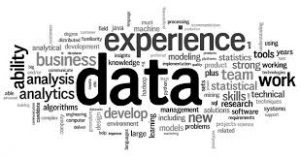That Four Letter Word
Hello, my name is Jeremy, and yes. I like data. In fact, these days I’d go as far to say I’m a data geek. I wasn’t born as one. Neither was I nurtured as a child to embrace the use of numbers in daily life. In full disclosure, I admittedly disliked math class, regardless of how much I enjoyed my teachers. (Given my natural resistance to the whole process of math, I’d say they were among my most effective teachers as they could keep me in my seat even though I would rather have visited the dentist.)
No, what I’ve learned is that data is both useful and powerful. I suppose it’s like learning a new game. Initially, you gain an appreciation of the rules. Then as you become more familiar with the game you’re better able to understand its underlying complexities. You can appreciate the intricacies of a well-played match. It also doesn’t hurt to win said game, either.
In today’s world, folks are definitely winning the data-game. It’s no longer just at the fingertips of accountants and insurance adjusters. Just look at how it’s included in our daily lives. How it impacts us in very reinforcing ways. To further enhance this dynamic, we have embedded various electronic devices in our lives to gather sources of information. We track our ‘likes,’ our re-tweets, our caloric intake, our steps, even the amount of imaginary creatures we are able to capture.

Then, in the spirit of good data, we modify our behaviors in an attempt to optimize our efforts. Long gone are the days of, ‘well, let’s give it the old college try’ or ‘I feel like this could work.’ We know when we took it too easy in our last workout and thereby burned 65 fewer calories. We recognize that our last political post on social media yielded 20 fewer ‘likes’ than the jumping-pajama-wearing-goats video.
As a self-professed geek, I’m awash with personal and professional data. I enjoy measuring the various components of my life (well, mostly, except for the discouraging workout listed above). Something that does give me pause when watching this flow of information, however, is questioning the integrity of the data and its collection process. Is it what I want to measure? Does measuring it meet the purpose of my goal? Can I trust the information’s reliability? Is it available at intervals that are consistent with the spirit of my goal?
Within Grafton, we’ve gotten far beyond the concept that gathering data is a good process. We’ve played the game and understand how it benefits our clients and employees. Long gone are the discussions about the appropriateness of a goal and its associated data (not that this conversation never occurs anymore, but it is something typically negotiated by an IEP or MDT team while they are forming at case conceptualization). In my opinion, we are now at a far more delicate and simultaneously frustrating juncture. We’ve assessed the rules of our data-game, and now discuss its intricacies.
The team now discusses the manner in which the goal is written and associated data that would be collected. Is it meeting the client/employee’s need on a variety of levels? Is it timely enough? How does the organization of the data and the reporting of information contribute to the treatment of the client and/or development of the employee?
Again, as a data geek, I’m fascinated by these conversations. Each client offers a unique set of variables which impact the discussion. How long does the team anticipate needing our services for care? What are the discharge expectations for successful treatment? Does the spirit of the goal meet the expectations of all stakeholders, including the client as well? What does previous data tell us which would be relevant to the conversation?
In terms of management conversations, our Key Performance Indicators dictate numerous factors for consideration. Past and current performances of the KPI can dramatically alter future goals. When we analyze ways to grow, would the current goal/associated data help in the most effective manner possible? Are we engaging the correct stakeholders in these conversations, or are there other perspectives which could offer valuable insight?
Can the details of these conversations become frustrating? Sure! At times, it would be easy to just shrug, take the path of least resistance, and consider it appropriate to compose a goal which would yield consistent data to measure its progress, and leave it at that. It would be more comfortable to avoid the conflict of varying opinions and extended discussions. Doing so, however, would be a disservice to our clients and employees, as well as all the decisions that we’ve made over the years which have laid the foundation for such an opportunity. These data-driven discussions are much richer, and our clients and employees deserve that care and attention. It does take more work, but aren’t they certainly worth it?
If you find yourself in these conversations, reflect on the colossal steps that you and your team have taken to get to that situation. Be encouraged by all the work you’ve already accomplished. You’ve learned the data-game and are now thinking critically about the intricate variables which impact the client or employee who you support. Not only are you helping to form a new goal, but you are also contributing to our ever-evolving narrative as a data-driven organization.